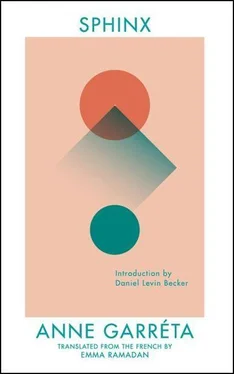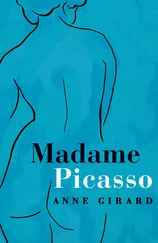Anne Garreta - Sphinx
Здесь есть возможность читать онлайн «Anne Garreta - Sphinx» весь текст электронной книги совершенно бесплатно (целиком полную версию без сокращений). В некоторых случаях можно слушать аудио, скачать через торрент в формате fb2 и присутствует краткое содержание. Год выпуска: 2015, Издательство: Deep Vellum Publishing, Жанр: Современная проза, на английском языке. Описание произведения, (предисловие) а так же отзывы посетителей доступны на портале библиотеки ЛибКат.
- Название:Sphinx
- Автор:
- Издательство:Deep Vellum Publishing
- Жанр:
- Год:2015
- ISBN:нет данных
- Рейтинг книги:3 / 5. Голосов: 1
-
Избранное:Добавить в избранное
- Отзывы:
-
Ваша оценка:
- 60
- 1
- 2
- 3
- 4
- 5
Sphinx: краткое содержание, описание и аннотация
Предлагаем к чтению аннотацию, описание, краткое содержание или предисловие (зависит от того, что написал сам автор книги «Sphinx»). Если вы не нашли необходимую информацию о книге — напишите в комментариях, мы постараемся отыскать её.
is a remarkable linguistic feat and paragon of experimental literature that has never been accomplished before or since in the strictly-gendered French language.
Anne Garréta
Pas un jour Emma Ramadan
Monospace
Sphinx — читать онлайн бесплатно полную книгу (весь текст) целиком
Ниже представлен текст книги, разбитый по страницам. Система сохранения места последней прочитанной страницы, позволяет с удобством читать онлайн бесплатно книгу «Sphinx», без необходимости каждый раз заново искать на чём Вы остановились. Поставьте закладку, и сможете в любой момент перейти на страницу, на которой закончили чтение.
Интервал:
Закладка:
We left right at the beginning of January, not long after the New Year. The day we arrived we visited A***’s mother, whom I was meeting for the first time. She was living alone in a studio, on the twelfth floor of a building on Second Avenue. Behind her apparent reserve upon their reunion, which contrasted starkly with the effusive demonstration of affection deployed by A***, I perceived the joy, or rather the painful relief, brought on by this homecoming. The insidious pain inflicted on her by A***’s long absence seeped through her happiness. I sensed the misery, the despair caused by the distance from the sole person she loved. She wouldn’t even allow herself to show this sadness, so deep was the wound. She considered me attentively without asking any questions and, it seemed, accepted me without need for discussion. I was there with A***, who seemed to be attached to me and to whom I seemed to be attached. What did she suspect our relationship to be? What did she think of it? I never knew. All I learned, which I heard through A***, was that she appreciated my attentiveness and my lack of histrionics. Of all the people she had had the occasion to see in A***’s company, it was for me, apparently, that she had the most esteem. She was astonished by how young I was (ten years younger than A***). She thought it was a good omen that I wasn’t particularly extroverted. I think she feared for A***, not knowing anything about her child’s life, and what she imagined or heard of it did not reassure her in the least. And, though she never regarded A*** with disapproval, she did not manage to conceal her anxiety. She was as apprehensive of meeting me as she was excited: she was no doubt dreading that she would not care for me as much as A*** was counting on it.
We stayed in a hotel for three nights, waiting for one of my former fellow university students to hand over his apartment in the city, which we would stay in during his upcoming absence. Our room, on the 25 thfloor of a modern building, opened onto East 42 ndStreet. We had agreed to spend our first nights in luxury: the room was big, the bathroom adorned with marble, and the bed immense. Despite the long trip and despite being awake for more than 24 hours, we weren’t tired at all, nor did we want to sleep. Through the taxi window, I had avidly observed all that passed before my eyes: the graffiti on the palisades and walls; the waves of oversized cars; the baroque decay of certain neighborhoods; the diversity of the people walking on the sidewalks. I felt intoxicated; the dreams I had suppressed in my state of prolonged wakefulness were turning everything I saw into visions: eyes open, I was dreaming this newly discovered city. The almost electric atmosphere of this place, completely new to me, was as exciting for me as it was for A***, whose childhood and adolescence had been lived out in this familiar setting. For the first time, we could feel like a couple; in this restless, teeming city we were experiencing an ineffable, exalting feeling of intimacy and togetherness. The city before our eyes and under our feet united us through its simple strangeness or familiarity. I was trying to decipher the traces of A***’s past life, and for A*** this trip served as a type of secret confession.
Turning away from the window where I had been contemplating the night sky and the horizon of lights, I did a little dance toward the bed. A*** came out of the shower, wearing only a towel. I coaxed A*** onto the bed, and then held my new prisoner captive between my arms and legs. As we rolled around, a juvenile excitement seized me, the desire to play, to roughhouse, to run out of breath doing something frivolous. I couldn’t remember having had such a desire for a long time; I had forgotten that state of mind, lost since childhood, and it returned to me suddenly in a hotel room smack in the middle of New York. I whispered inconsequential words in A***’s ear, who could do nothing but laugh. My body was immense; it could have embraced all of America. The blood in my arteries, the air in my lungs, the ideas in my head all shared the same lightness. I horsed around with A*** like I had never dared to do before, allowing myself the liberties and improprieties that formerly I had thought of as obscene, but which now seemed innocently naïve. When asked what I was doing, I replied that I had finished my homework and certainly had the right to play with my toys before my afternoon snack.
When we finally found ourselves side by side, smoking the inevitable cigarette, I said to A***, after a moment of silence and reflection, that it felt as if we had never, before this day, truly made love. For an entire year we had only endeavored to reach a very crude form of ecstasy. After the subtle sensuality we had just shared, all the other times seemed like a laborious peccadillo. I concluded that making love without laughing was as bad as gifting a book written in a language the recipient does not know. The obscurity of my metaphor perplexed A***; already my more serious side was feeling neglected. I leapt out of bed and proposed we go for a walk.
It was one in the morning, the air was cold but not freezing. We walked up Fifth Avenue. When we reached the edge of Central Park, there was silence: it had begun to snow. Horse-drawn carriages were still stationed before the Plaza. Our eyes were shining; I wondered whether A***’s body and heart felt as light as mine did. A*** was humming a song that I often put on at the Apocryphe toward the end of the night: “La Ville Inconnue.” I laced our arms together and began to sing along. Our two breaths condensed upon contact with the cold air and formed a cloud, as if the song was materializing before us.
By the time we got back to the hotel, the sidewalks were covered with a fine layer of snow violated only by our footprints. We lay down in the immense bed, shoulder-to-shoulder right in the middle, leaving a large white border on each side.

I know essentially nothing of white, Anglo-Saxon, Puritan America. My own America is of black origins — the music, the voices, the food. There’s a term for that in the black community: soul. Soul music, soul food. The nourishment of the soul?
Accompanying A*** to family reunions and meals during the season’s festivities, I found myself lost in the heart of a neighborhood where white people rarely ventured — some remote suburb of Long Island or New Jersey. For two days the women had been preparing a Southern-style meal, paying tribute to the family’s roots.
I hardly know the names of these dishes, let alone how they’re prepared. I lived among this family only the length of brief visits and, from one year to the next, I ate these dishes over and over again, without ever seeking to educate myself about them. I didn’t feel the need. It sufficed simply to be there, as if I had always belonged to their world. Others in my place would probably have tried to play the explorer and make curious inquiries, as an anthropologist or a traveler greedy to understand how or why. But what did I care? I felt at home there, so much did they make me feel like a part of their family, effortlessly forgetting our differences in race, color, culture, class — everything that one might cite as possible traits of alterity. It was as if the language they were speaking and the food they were cooking had always been familiar to me.
And the old black mommas laughed with delight to see that I had such an appetite. A***, who was used to seeing me bored or indifferent when faced with earthly sustenance, was astonished and overjoyed. I was forgetting to repine, I was finally tasting life, savoring each bite without the table-talk that, in Europe generally, and in France particularly, constitutes the essential component of meals.
Читать дальшеИнтервал:
Закладка:
Похожие книги на «Sphinx»
Представляем Вашему вниманию похожие книги на «Sphinx» списком для выбора. Мы отобрали схожую по названию и смыслу литературу в надежде предоставить читателям больше вариантов отыскать новые, интересные, ещё непрочитанные произведения.
Обсуждение, отзывы о книге «Sphinx» и просто собственные мнения читателей. Оставьте ваши комментарии, напишите, что Вы думаете о произведении, его смысле или главных героях. Укажите что конкретно понравилось, а что нет, и почему Вы так считаете.












